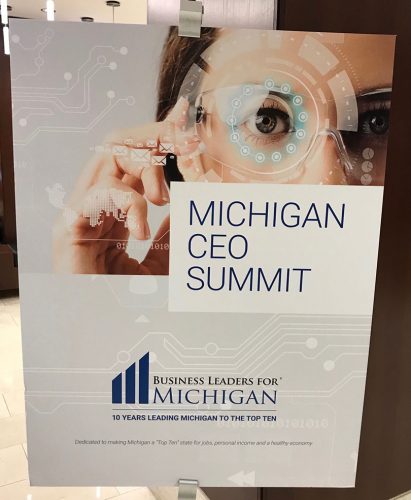Artificial Intelligence will benefit your health in many ways, according to David Allard, M.D., Chief Medical Officer at Henry Ford Health System, but it will never replace your doctor. Rather, it will augment what your doctor does. “A.I. is like a Body OnStar,” explained Dr. Allard, at Business Leaders for Michigan’s 2019 Michigan CEO Summit this week. He clarified that in the past, medicine was a reactive science, “waiting for something bad to happen”; now, it’s predictive analytics, with AI allowing clinicians to “visibly keep tabs on people before the bad happens.”

Fellow panelists, Jeanine Heck, VP, AI & Discovery, Comcast; and Rich People, Director, Artificial Intelligence & Machine Learning Center, General Motors Company, agreed that the biggest concern with AI is data breach. In this era of identity theft and the Facebook breach, public fear of privacy invasion is far from artificial. Heck explained that cable is provided in the most private place – your home. Hence, her employer places strong emphasis on the customer privacy policy. Dr. Allard believes it’s different in the healthcare space. “In healthcare, we must embrace this concern as data should be both private (PHR) and public…In medicine, we really want to share the secret sauce. If we have a cure for cancer, that should be public knowledge.”
Allard illuminated that hospital clinicians make 3 to 4 hundred decisions on a patient’s care daily, leaving much room for human error (“hopefully, it’s toast instead of a muffin…”) “We have to be better than human,” he espoused. “We have to get folks to constantly think ‘How good is good enough?’”
Biggest worries concerning AI? “That people get so excited about the BIG things, we forget how much we can help by doing something small (like monitoring sugar or preventing an asthma attack)”, advises Allard. He also cautions that we must keep the right amount of confidence in AI, but treat it as a “trusted colleague”, not something we blindly follow.
His biggest AI goal: Translation. Meaning getting technology out of the way, by improving navigation and access so patients and providers can have uninterrupted conversation. Which will inevitably improve outcomes. Now that sounds intelligent!























